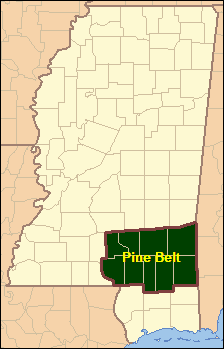History
Before the arrival of Europeans, the area that would later become the state of Mississippi was populated by several Native American tribes, including the Natchez and Pascagoula in the Pine Belt. [3] [4] The native population declined as a result of armed conflicts with the Europeans, attrition from diseases, or coalescence with other tribes. [4] [5]
In 1817, the western portion of the Mississippi Territory was admitted to the Union as the State of Mississippi. Yet, the vast longleaf pine resource in Mississippi's Pine Belt remained mostly undisturbed, because there was no efficient system for transporting cut timber to sawmills for processing into lumber. That changed in the late 1800s, when railroads were built throughout the Pine Belt. These railroads provided an inexpensive means for moving passengers as well as logs and lumber, and opened Mississippi's Pine Belt to both industrial growth and community development. Notable railway construction during this era included the Gulf and Ship Island Railroad; New Orleans and Northeastern Railroad; and the Mobile, Jackson and Kansas City Railroad. [6] The Pine Belt's booming timber industry ended around 1930, when the virgin pine forests were depleted. [6]
As World War I raged in Europe, military training sites were being created throughout the United States. [7] As part of that effort, one of those training sites was established in the Pine Belt south of Hattiesburg in 1917. Over time, that training site transformed into Camp Shelby Joint Forces Training Center. [1] Camp Shelby is the largest state owned military training facility in the U.S. and covers more than 134,000 acres (54,000 ha). [8] [9]
This page is based on this
Wikipedia article Text is available under the
CC BY-SA 4.0 license; additional terms may apply.
Images, videos and audio are available under their respective licenses.
